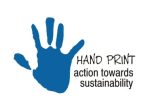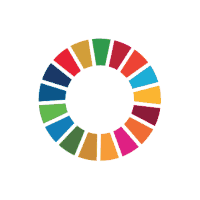Eco school India
- Home
- Eco school India
Sustainability education serves as a vital link between schools, society, and students by fostering awareness, knowledge, values, and skills that empower individuals to contribute to a more sustainable and equitable world. The program offers a structured way for schools to address environmental challenges, educate students about sustainability, and encourage positive behaviors that can lead to lasting changes in both school communities and society at large. It not only raises awareness about environmental issues but also empowers students to become responsible stewards of the environment and advocates for a more sustainable future.


Eco Schools logo has an open book at the center which indicates acquiring of knowledge in school. Green symbol in the centre is a learner as well as people. The leaves forming a canopy of the tree showcases the whole school working together to become a sustainable school.

Handprint is a symbol of hope, to make us believe, have the courage and commitment to solve environmental and sustainability problems. It captures the energy of young minds, who have the caring attitude for building sustainable societies and to inspire all to be responsible for a healthier planet.
About the Programme
The Eco-Schools International Programme was developed as a response to some of the needs identified at the UN Conference on Environment and Development in 1992. Presently being implemented in over 70 countries, the programme has been implemented in India by the Centre for Environment Education since 2015.
Eco-Schools is a growing phenomenon, which encourages young people to engage in their environment by allowing them the opportunity to actively protect it. It starts in the classroom, it expands to the school and eventually fosters change in the community at large. Through this programme, young people experience a sense of achievement at being able to have a say in the environmental management policies of their schools, ultimately steering them towards certification and the prestige which comes with being awarded a Green Flag. The Eco-Schools programme is an ideal way for schools to embark on a meaningful path towards improving the environment in both the school and the local community while at the same time having a life-long positive impact on the lives of young people, their families, school staff and local authorities.
The main goals of the Eco-Schools programme are
- Inclusivity: The program involves students, teachers, and the local community, fostering an all-inclusive and participatory approach.
- Improved School Environments: Eco-Schools program paves the way for schools to enhance their environmental impact, resulting in more sustainable, cost-effective, and responsible school environments.
- Motivation: Eco-Schools challenges students to address environmental issues and witness tangible results, motivating them to realize their capacity for making a positive impact.
- Attitude Improvement:Eco-Schools nurtures students’ sense of responsibility and instills a sustainable mindset for daily application. It empowers participants to effect change and inspire others, creating a ripple effect for generations.
- Community Involvement: Eco-Schools strongly emphasizes engaging the local community from the outset. Lessons learned by students extend to the community, fostering sustainable behaviors.
- Global Connections: Eco-Schools enables interactions among participating institutions, not only nationally but also internationally. These connections promote environmental knowledge exchange, cultural interaction, and language skill enhancement.
Selection of themes:
In order to be eligible for the Eco-Schools Award, the school must choose and work on a minimum of three themes based on the guidance and suggestions of the eco committee. This section of the manual provides thorough instructions for choosing a topic and implementing the programming in schools. Based on all five programmatic areas, the school is required to conduct an environmental assessment of its surroundings. Based on the evaluation, the school must choose three crucial topics for both students and teachers under the programme. Schools must execute the programme within the specified schedule when the environmental study concludes and themes have been chosen in order to get the Eco-Schools Award. The pages that follow provide a brief overview of the five theme areas and a list of potential initiatives that the school might pursue in order to receive the Eco-Schools Award.
Themes

Water

Waste

Healthy Living

Energy

Biodiversity
Theme 1: Water
Start-up Idea
School washrooms and drinking water points are some of the sources for wasteful use of water. Regular audits and checks conducted by students could ensure all taps are closed after use; leaky taps get reported and replaced. This builds in students a sense of responsibility towards a common resource and helps conserve the same.
What it’s about?
Water is one of the most common substances on Earth. With water covering over 70% of the Earth’s surface it is easy to find. It is also indispensable in nature; we need water for all our requirements, from bathing to drinking, cooking and others. Children are familiar with water. It would be important to familiarize them with importance of water and the need to conserve the same.
Some more ideas
| 1. | Personal water use survey sheet – individual students to monitor for a week the quantities of water they consume for different personal activities in day. Activities may include bathing, drinking, toilet flushing, etc |
| 2. | Survey of leaking/ dripping taps in the school campus |
| 3. | Exploring and implementing the possibility of the “water bin concept” for reusing/ recycling waste water. |
| 4. | Observing/ promoting eco friendly festivals to avoid pollution of water. |
Enviro-Calendar Linkages
| 2nd February | World Wetland Day |
| 22nd March | World Water Day |
| 18th April | World Heritage Day (this day could be observed along other themes too) |
| 8th June | World Oceans Day |
Theme 2: Waste
Start-up Idea
A recycling drive by students at their school can help them collect at designated place in the school different types of wastes including plastic, pet bottles, glass bottles, tetrapak, milk sachets, electronic waste among others, which in other circumstances would end up in a landfill site. Monthly record of the types and total quantity of each type of collected waste materials to be maintained. Wastes could be routed out for recycling to identified end users. This would not only provide a proper channel of disposal to some of these products but also teach students the importance of segregation and recycling. As add on ideas schools could choose to convert some of these wastes into art forms for use as murals or other purposes. Sold recyclable material could also help the school generate some revenue.
What it’s about?
Any unwanted material is waste. Waste can be in different forms – solid, liquid and even gaseous. Waste if discarded properly could also be reused in some form or could at least be routed into the recycling stream. Unfortunately lack of knowledge, lack of proper collection centers and merely lack of attitude are some of the problems for the disposal of waste items. How this helps a school, is not only does it enable students to set the correct precedent but also carries the education back to the homes.
Some more ideas
| 1. | Schools could have demonstration units of recycling compostable waste |
| 2. | If generation of biogas is a viable option, then some schools could explore the same |
| 3. | As extension activities, older students could be asked to study more about how some waste materials can be recycled |
| 4. | It’s not just about solid waste, schools could also choose to appropriately deal with the generation of liquid waste, hand wash water routed to the school garden for e.g. or a small demonstrational water treatment plant established at the school. |
| 5. | Initiate a drive to collect material which could go towards making of recycled cloth and paper bags |
| 6. | Adopting practice of using both sides of papers; donating/reusing old text books; donation of old toys/books etc. |
Theme 3: Healthy Living
Start-up Idea
Schools are an important learning centre for children where a change can be brought about among children. Schools can play an important role in the diet of children. Some schools can influence the diet of children by consciously altering the food served to the children, others can influence what children bring to school and still further educate children about the need for a good diet and appropriate sanitation practices.
What it’s about?
Adequate nutrition is essential to ensure good health, growth and overall development among children. Poor nutrition also increases the risks of illness. Inappropriate nutrition can lead to childhood obesity which is an increasing public health problem in many countries. Good hygiene and sanitation practices too plan an important part in the overall health of a child. What children eat? How they keep themselves clean? Do they understand the linkage between clean hands and good health? Are some of the ideas which might crop up?
Some more ideas
| 1. | Establishing a nutrition garden in the school. |
| 2. | Healthy snack time at school |
| 3. | Getting children to understand what they eat? |
Enviro-Calendar Linkages
| 7th April | World Health Day |
| 15th October | |
| 16th October | World Food Day |
| 2nd December | National Pollution Prevention Day |
Theme 4: Energy
Start-up Idea
Consumption of electricity is a fantastic way for children to gauge how they are using and conserving energy. Simple audit in the school could be carried out to understand the why and when they use different appliances and the duration of their use. Students could keep a track of these and the same could be turned off when not in use. It is important to keep a track of the monthly electricity bills to understand what difference the efforts of the students are really making. Students could also be provided personal sheets to monitor electricity consumption in individual homes and how the same could be reduced.
What it’s about?
We need energy to do work. Energy helps light up our homes and schools, helps run our vehicles, helps cook our food and helps plants grow. It would be a fantastic way to teach children about the different sources of energy, why we need energy and the need to conserve the same.
Some more ideas
| 1. | Students could maintain monthly records of the electricity consumption at their homes |
| 2. | Students could regularly monitor electricity consumption within their schools to ensure switching off of lights, fans and other electrical appliances examples smart boards and computers when not in use. |
| 3. | Students could undertake a transport survey in their school to understand how students commute to the school and what the kind of environmental impact caused is. |
Enviro-Calendar Linkages
| 15th – 31st January | Oil and Gas Conservation Fortnight Last week of March: Earth Hour |
| 20th March | World Sparrow Day |
| 22nd April | Earth Day |
| 16th September | International Day for the Preservation of the Ozone Layer |
| 14th December | National Energy Conservation Day |
Theme 5: Biodiversity
Start-up Idea
If greenery exists or there is a garden in the school, students could make a checklist of the different types of species. They could make herbaria of different types of leaves and flowers and also start a seed bank. Alternately students could be provided small plots of land (pots would also suffice in case of lack of land) on which to grow vegetables. Students could be engaged in maintaining a vitamin garden – different vegetables and leguminous plants could be grown by students. Students could also be engaged in tasks including digging and planting, after care activities including watering, manuring, weeding and others.
What it’s about?
Biodiversity is all around us. Elements of biodiversity fascinate children and are a fantastic way of engaging them in the learning process. They deal with biodiversity on a daily basis – food, medicines, clothing, an array of things are obtained from biodiversity.
Some more ideas
| 1. | Recording different types of birds and animals observed on campus. |
| 2. | Recording different plant species found within or in the vicinity of the school campus – classifying these into different categories herbs/ shrubs/ trees/ creepers/ climbers; fruit bearing/ non fruit bearing; medicinal and others. |
| 3. | Observing and recording seasonal variations in some of the plants growing in the school |
| 4. | Maintaining a butterfly garden at the school |
| 5. | Growing some vegetables and fruits in the school for e.g. carrots, tomato, papaya – students engage themselves in the care and harvest of these which could be then utilized in the school. |
| 6. | Non-fire cooking activities in the school including a healthy salad or a snack |
| 7. | Documentation of recipes of different traditional food stuffs |




